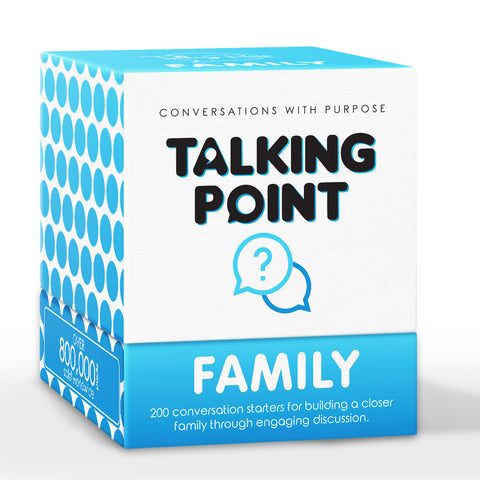Add description, images, menus and links to your mega menu
A column with no settings can be used as a spacer
Link to your collections, sales and even external links
Add up to five columns
Add description, images, menus and links to your mega menu
A column with no settings can be used as a spacer
Link to your collections, sales and even external links
Add up to five columns
100 Hours of Connection
Backed by Experts Worldwide
Over 1 Million Customers

Cutting Down Screen Time Creatively: Family Conversation Cards
March 28, 2024 5 min read
According to a recent study, 9 out of 10 parents in America believe that shared experiences and family time strengthen their family bond, but 40% of parents report that screen time has become more important in their homes than family time. So how can you turn that around?
If you’re passionate about building strong bonds with your family, you have to seek out creative ways to cultivate meaningful relationships and find something that is more engaging than screen time. So this post helps you find ways to encourage your family to put their phones down and simply transition to conversations that promote deeper connections with family conversation cards.

Tips to Incorporate Conversation Starters with Family
With those statistics, it’s obvious that there’s a struggle with creating space for building relationships within the family. While screens play a vital role in the average American’s day-to-day life, from work or school to scheduling your life, screens of some sort are necessary. However, this study revealed how the average family in America spent only 37 minutes of quality family time daily during the entire week.
Every family is busy, so adding one more thing into your life may sound exhausting. But you can use these ideas to incorporate some meaningfulness into your family’s everyday tasks and to easily create screen-free times that make a great opportunity to use family conversation cards for thoughtful family conversation:
- Family meeting: Schedule a weekly family meeting where everyone can gather to discuss schedules, events, and any topics of importance. Use this time to plan family activities and designate conversation times.
- Mealtime ritual: Designate mealtimes, such as dinner, as sacred moments for conversation. Encourage everyone to share highlights of their day, express gratitude, and engage in meaningful discussions with the help of family dinner conversation starters.
- Tech-free times and zones: Create specific areas in your home where screens are not allowed and do the same for family-oriented activities, such as mealtimes. These circumstances are natural areas for conversation, and having no screens around promotes face-to-face interaction and conversation. Be sure these zones are designated spaces for family chats.
- Daily check-ins: Set aside time each day, such as before bedtime or during breakfast, for quick check-ins with each family member. Ask about their day, share experiences, and address any concerns or successes. While these are moments that the entire family shares, they can help inform you as to how you can best encourage engagement when you do have family conversations.
- Weekly family activities: Plan regular family activities, such as game nights, movie nights, or outings, where conversation naturally flows. Use these occasions to connect and bond with one another. Whether you use family conversation starters before or after the event, they can serve as the perfect warm-up or wind-down activity.
- Designated conversation times: Allocate specific times during the week solely for conversation. Whether it's a walk after dinner, a Sunday afternoon chat, or a weekend brunch, establish these times as opportunities for open dialogue. Make these times convenient and accessible for the entire family so everyone can plan accordingly. If you create space for conversation but it’s during your teen’s normal homework time, you may not get far. But if you consider the cadence of a typical week, you’re sure to find pockets of time where the family is together, relaxed, and ready to talk as long as someone gets it started. That’s why family conversation cards can be so helpful—no one is on the spot to create a topic.
- Use a family calendar: Utilize a shared family calendar to coordinate schedules and set aside dedicated conversation times. Put in reminders, whether electronic or written, that help to get everyone thinking about your family time and excited to engage. You can even use a family conversation starter card as a question to think about leading up to your designated time together.
- Lead by example: As a parent, demonstrate the importance of conversation by initiating discussions and actively listening to your family members. It’s easy to ignore others when the busyness of life takes hold and simply nod while not really listening. Show your family how important they are by truly listening and interacting with them throughout the week. This will encourage open communication and create a safe space for everyone to express themselves.
By implementing these strategies, you can establish regular and meaningful conversation times with your family, fostering stronger relationships and promoting healthy communication habits.
Relying on Family Conversation Questions Not Screens
When life gets hectic, families often resort to screens. Whether it’s because everyone needs time to wind down or kids need to be occupied, screens often become the go-to choice, not because families are lazy, but because they’re busy and devices are an easy solution.
The problem families face, however, is that devices aren’t the solution to spending more quality time together. According to this study, a vast majority of parents (67%) agree that they spent more time with family than their kids are, and these parents are feeling the disconnect. The same study reports that nearly three-quarters of parents think they’re spending too little time with their children.

Getting creative and looking for pockets of time that can be filled with conversation or meaningful activities together as a family is key to turning this around. Normalize engaging with each other, especially in the small things, so that your family begins to look forward to these moments.
Consider these tips:
- Set boundaries: Learn to say no to non-essential commitments that may encroach on family time. Establish boundaries around work, social engagements, and other activities to protect dedicated family time. Some families don’t do sports or extracurricular activities while others allow every child to choose one. Still others may limit the time those activities can take away from family engagements. No approach is right or wrong. Your family culture is unique, and you just need to find the right balance.
- Find fun in the mundane: Consider how long it takes to get the kids to school or an activity, for example. Often kids are on a phone or tablet to make the ride enjoyable, but you can do the same. Set the tone during that drive time by engaging in conversation, and then stay committed to allowing everyone to be open without criticism or judgment. Use a fun family conversation question to get the communication going. When waiting in line, resist the urge to get on your phone and check your work messages; instead, engage your family in simple conversation. The point is to keep this kind of simple engagement a normal part of life. That makes engaging in deep conversations go a lot smoother.
- Multitask smartly: Look for opportunities to combine tasks with family time. For example, involve your children in meal preparation or chores, turning everyday activities into quality bonding moments.
- Flexibility is key: Be adaptable and willing to adjust plans when necessary. Life can be unpredictable, so embrace spontaneity and make the most of unexpected opportunities for family bonding.
- Lead by example: Show your family that spending time together is a priority by actively participating in family activities and being fully present during these moments.
- Quality over quantity: Remember that it's the quality of time spent together that matters most. Focus on creating meaningful connections and cherished memories, rather than simply filling up the calendar with activities.
By implementing these strategies and making family time a non-negotiable part of your routine, you can ensure that your family remains connected and bonded despite life's hectic pace.
Starting conversations with your family can be daunting when you consider the wide range of ages and the diverse interests of each unique individual. But when you prioritize and normalize engagement and family time, it’s not a big leap to deeper communication.
That’s where family conversation cards step in. You can relax with your family and open the lines of communication without trying to figure out a creative way to get it started. Talking Point Cards gives every family a fun and engaging way to bond as a family and connect on a deeper level.